
The use of an offshore company in Belize to pay part of the salary of its top Costa Rican executives between 2014 and 2015 put Dos Pinos Milk Producers Cooperative R.L.— one of the largest and most emblematic coops in Costa Rica— under the scrutiny of Ministry of Finance and Treasury authorities, the Costa Rican Social Security Fund (CCSS), the Public Ministry and even its own associates.
As a result of the actions of the authorities, the cooperative ended up paying 257.3 million colones (about $420,000 at the time) to the Department of Taxation in June 2018, and 617 millions colones (just over $1 million) to the CCSS in January 2020 for using this salary scheme to evade paying income tax and social security contributions.
In October 2019, while under investigation by the Department of Taxation and CCSS, the dairy producer registered another offshore company, this time in Panama, called Logística Empresarial Internacional S.A. Its shareholders are First Caribbean Investment Company, registered in the British Virgin Islands, and Transnieve Ltd, in Barbados, both jurisdictions considered to be tax havens that lend themselves to being used to elude or evade paying taxes.
Until the publication of this investigative report, Logística Empresarial Internacional was unknown within Dos Pinos’ conglomerate of subsidiaries for its commercial operation in the region (Guatemala, Panama, Nicaragua and the Dominican Republic). In other words, it isn’t mentioned on the cooperative’s website and several of its associates don’t know about it.
These are some of the findings of an analysis of thousands of documents conducted by Costa Rica News Channel 13 in Costa Rica and the Latin American Center for Investigative Journalism (CLIP). These documents pertain to several firms that specialize in managing offshore companies in Panama, the British Virgin Islands, and other countries. This report is part of an international investigation, led by the International Consortium of Investigative Journalists (ICIJ).
An anonymous source sent 2.94 terabytes of confidential financial records in separate batches to ICIJ over several months, totaling more than 11.9 million documents from 14 offshore services firms that create and manage paper companies and trusts in tax havens around the world. Dubbed the “Pandora Papers”, they span 24 years from 1996 to 2020, and are in English, Spanish, Chinese, Greek, Russian and other languages, revealing connections between companies and businesses in more than 200 countries and territories. More than 600 journalists in 117 countries collaborated on the investigation.
Costa Rica Noticias and CLIP consulted the cooperative about the reasons why it has created these offshore companies in jurisdictions such as the British Virgin Islands, Barbados and Panama. The director of Corporate Relations and Sustainability, Luis Mastroeni Camacho, responded that he couldn’t reveal many details due to it being part of the company’s “commercial and business strategy.”
In general terms, he replied that the reason for creating companies in other countries (without specifying which ones) “is in response to the business structure of the business group. The companies that are in the countries are independent entities, with their own legal identity. They are created precisely to leverage the expansion strategy of our businesses in other Latin American countries and in the Caribbean.”
Operating commercially in those countries under the cooperative model isn’t viable,” Mastroeni argued, and affirmed that in countries where other companies are created, they pay taxes and comply with the legal framework.
However, the Dos Pinos cooperative doesn’t export or distribute its products in the British Virgin Islands or in Barbados, as the company itself confirmed to this journalistic alliance by email. The Director of Corporate Relations and Sustainability explained that these companies were created to make the business “viable.» However, the official alleged business confidentiality to reveal the specific line of business of this offshore organization.
Costa Rica doesn’t have a tax information exchange agreement with Barbados, Panama or the British Virgin Islands, so tax authorities aren’t allowed to supervise these companies.
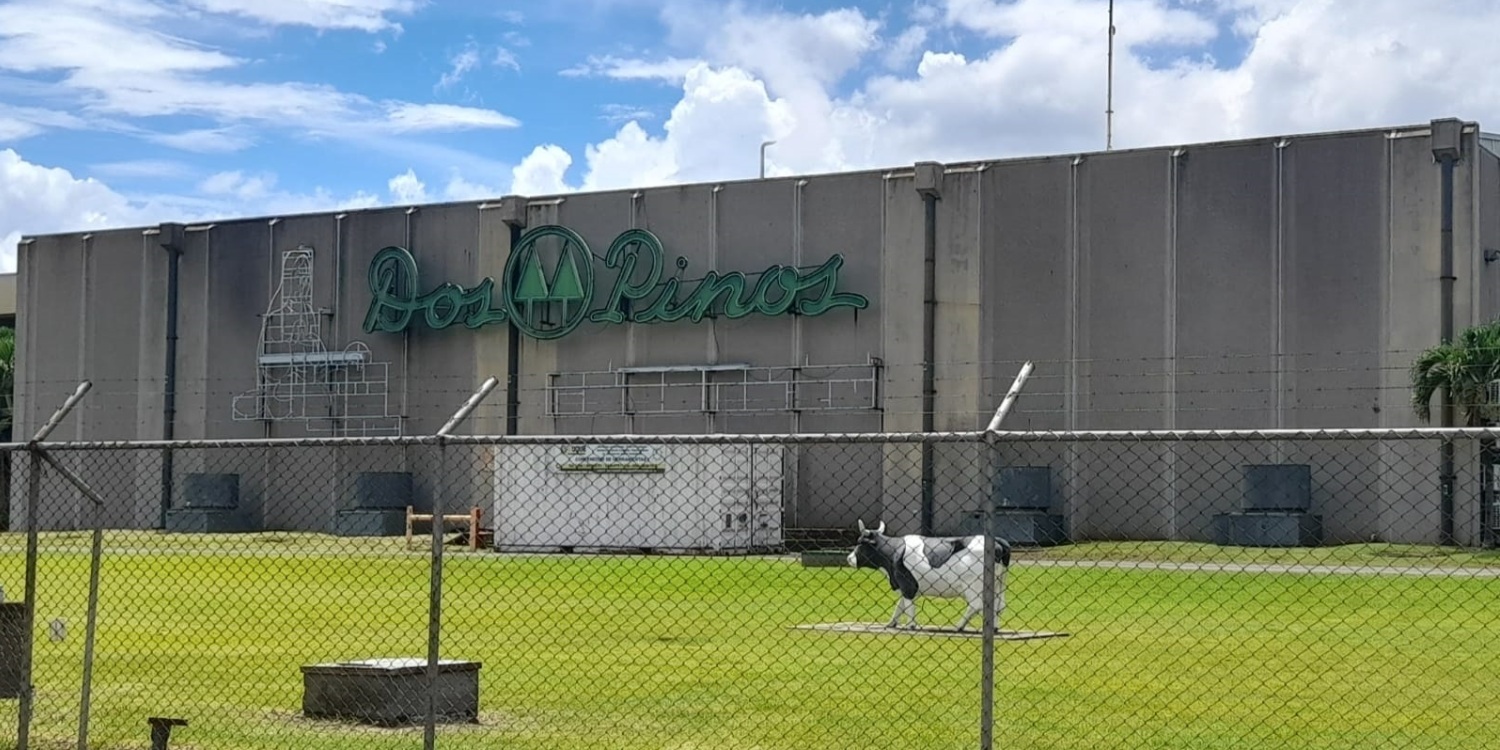
The Dos Pinos Milk Producers Cooperative has its main dairy plant in El Coyol de Alajuela, Costa Rica. From here it exports to 11 countries.
Repeating the Offense with Another Offshore Company
The creation of the offshore company Logística Empresarial Internacional is recorded in internal documents from the firm Overseas Management Company (OMC), known by ICIJ as part of the Pandora Papers journalistic project.
According to records from Panama, Logística Empresarial Internacional (LEI) was created in February of 2019 by three other companies, all using the same address as the corporate service provider OMC in Panama City and with all directors associated with this firm, which suggests that OMC could have created the company LEI in order to later offer it to a client who needed it.
However, the leaked documents allow us to see that in October 2019, OMC made a change in that company: the shares would be transferred to the companies First Caribbean and Transnieve, while the final beneficiaries would be “Members of Dos Pinos Milk Producers Cooperative R.L.” from Costa Rica, and Panamanian businessman Jose Benjamin de Dianous Gonzalez, according to an application form in the OMC file.
De Dianous was a member of the board of directors of the National Bank of Panama between 2017 and 2018, appointed by President Juan Carlos Varela in April of 2017. He was also the president and legal representative of the Panamanian state-owned company Mercados Nacionales Cadena de Frío S.A., a big-money project of former Panamanian President Ricardo Martinelli, which sought to create a network of wholesale and retail markets to improve the commercialization of food products, especially perishables.
The businessman made his name above all as a partner of Global Products and Logistics Services (Dicarina), one of the distributors of mass consumer products in his country.
In 2014, Dos Pinos had allied precisely with Dicarina to distribute its dairy products in Panama, according to the judicial file of the case related to paying executives using an offshore company in Belize.
According to Logística Empresarial Internacional’s (LEI) registration form, De Dianous was appointed as president; another Panamanian, Joseph Mawad was named vice president and Costa Rican Digna Maria Moya Gonzalez was listed as secretary. The latter has been the financial director of Dos Pinos for a decade. On the document, all three people gave the same date of birth.
LEI was registered with a capital of $10,000 ($1 per share) with the objective of “investing in preferred shares of an operating company,” the source of income being “investment of personal funds.”
Both Mawad and De Dianous are listed in the OpenCorporates business database as directors of several Panamanian companies. The latter appears as director of at least 10 companies.
To create the LEI company, the financial director of Dos Pinos listed the cooperative’s plant in Coyol de Alajuela, in Costa Rica, as her address.
Two Paper Companies Owning a Real One
Dos Pinos’ connections to offshore companies don’t end there.
According to the OMC registration form, the majority shareholder of Logística Empresarial Internacional is First Caribbean Investment Company, Inc. (with 54.1% of shares). This company was registered in the British Virgin Islands on July 20, 2004 with a capital of $50,000. The registration was done by an agent of the Panamanian law firm Alfaro, Ferrer & Ramírez (BVI) Limited.
First Caribbean, which is not authorized to issue bearer shares, is active, according to the British Virgin Islands (BVI) Corporate Affairs Registry certificate.
The form also listed Transnieve Ltd, a company in Barbados, as the owner of 39.17 percent of LEI’s shares. The ownership of the remaining 6.73 percent wasn’t identified.
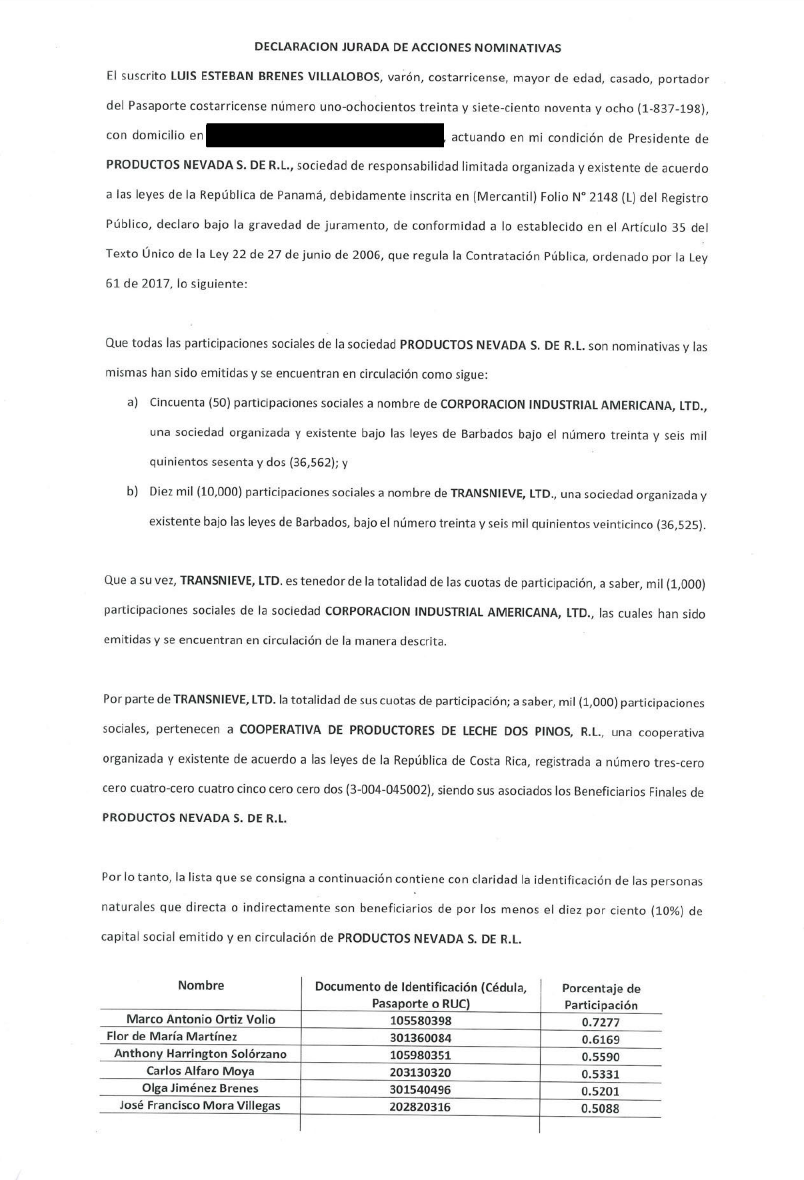
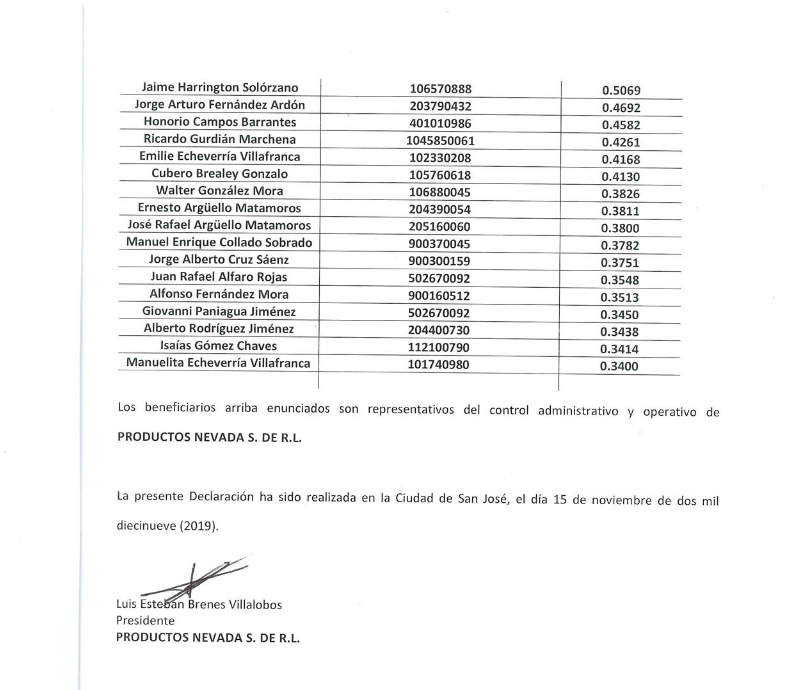
In an Affidavit of Nominative Shares of Productos Nevada issued in Costa Rica in November of 2019, which is also in the OMC files, Luis Esteban Brenes Villalobos, the business director of Dos Pinos for more than a decade, provided information about final beneficiaries of companies, as required by law.
This document makes it possible to see the network of offshore companies related to the Dos Pinos cooperative, as shown in this infographic.
The Costa Rican coop owns the company Transnieve Ltda, registered in Barbados in December of 2012. In turn, Transnieve is a shareholder of several companies: Corporación Industrial Americana (Barbados), Logística Empresarial Internacional (Panama), Snow Foods SRL (unknown jurisdiction) and Productos Nevada (Panama).
Productos Nevada is a leading company in the dairy industry in Panama, which has invested more than $119 million there in dairy production and in setting up its milk distribution chain.
Brenes, who made the statement as president of Productos Nevada, indicated that the final beneficiaries of that company are the associates of the Dos Pinos cooperative.
At the same time, he presented a list of 23 people as beneficiaries of at least 10 percent of the shareholder equity of Productos Nevada and representative of the administrative and operational control of the company, including Carlos Alfaro Moya, current member of the Dos Pinos Board of Directors; Jaime Harrington Solorzano, a former member of the board, and 21 other people.
The Dos Pinos spokesperson was asked if these people are associates and why they are listed as beneficiaries of that 10% of the shares. “Due to cooperative policy, I can’t give you that information,” he replied.
Digna Moya Gonzalez was also on the board of directors of Productos Nevada, as stated in this document from 2016.
This journalistic alliance discovered that Productos Nevada also belongs to the company Corporación Industrial Americana Ltd., registered in Barbados, which owns 50 shares. The latter, however, registered an integration process under the Insolvency and Bankruptcy Code (IBC) on November 20, 2013, according to the Caribbean country’s registry.
It’s unclear why Dos Pinos set up this complex scheme of paper companies as shareholders of its dairy company in Panama. Since it is a cooperative, Dos Pinos is exempt from paying income tax on its earnings, because these are distributed as surpluses to its associates, but it is obliged to withhold income tax from the salary it pays to its employees.
It’s also obligated to retain 10% of income on the surpluses distributed to its associates and to contribute with other parafiscal obligations.
In 2018, as part of the discussion on tax reform in Costa Rica, there was a proposal to levy a 30% income tax on the profits generated by large cooperatives, like what the rest of the companies are charged. However, the idea, promoted by the Ministry of Finance and Treasury and supported by some legislators, ran into strong opposition from cooperatives and the majority of legislators in Congress. It was rejected in the end.
In light of that, a group of legislators promised to support another initiative to collect taxes from cooperatives with surpluses greater than 250 million colones per year (about $397,700), but that also failed faced by opposition from the legislative majority and a big-money lobby promoted by cooperatives.
We asked Luis Mastroeni, the spokesperson for the cooperative, if Dos Pinos doesn’t see any contradiction in maintaining these companies in jurisdictions considered tax havens, where Costa Rican audits are practically impossible.
As a cooperative, we generate these companies, we have these companies abroad, with the sole purpose of being viable and being commercially operative in those places,” he repeated.
He added that everything follows the law. “The law is complied with in those places, all the taxes that have to be paid are paid and they are all consolidated in Costa Rica to generate a greater benefit to the producers,” he said.
Asked by ICIJ about Dos Pinos’ companies, OMC replied in a letter that it can’t answer anything about its clients because it is confidential information, but stressed that it complies with all applicable laws in the jurisdictions where it operates. “OMC is committed to compliance and maintains a solid compliance program with that regard, including due diligence policies and procedures,” they stated.
Associates Unaware of Offshore Companies
Two associates of Dos Pinos consulted by this journalistic alliance said they were not aware of this network of companies and pointed out that the information shared by the board of directors regarding the company’s business decisions is increasingly more limited.
“From ten years ago to now, everything is secretive,” said a dairy farmer from the Tilarán area, who asked us to protect his identity so as not to have conflicts with the cooperative. “We find out about the information from what comes out in the newspaper or through rumors. If someone finds out about something and comments, one finds out, but information directly from Dos Pinos, very little.”
This producer, who said he didn’t even have any idea what an offshore company is, expressed concern that the cooperative’s business dealings could end up generating losses because “in the end, we, the associates, who are the primary [producer], absorb [the losses].”
He said that a few years ago, a single call was enough to clear up any doubts they had as associates. “Now you have to ask everyone for permission, send a letter requesting it and, depending on the information, they don’t give it to you,” he explained.
For this same reason, he also doesn’t know if what the cooperative generates as dividends is the amount that he should really get, if it should be more or less. “They just give us a general analysis at the end of the year. Since there isn’t any information, I can’t be sure if it’s correct or if something is missing,” he said.
Another associate, but from the San Carlos area, who also agreed to speak anonymously for this journalistic investigation, said that he and other associates feel uneasy about how administrative and financial expenses of other projects abroad were redistributed and agro-veterinary warehouses had to assume and increase the costs to the producer. “As there is an increase in costs for the producer, profitability decreases,” he said.
“The associate is given industry reports where they present it as solid, but that is not happening on the farms. Farms are struggling because of costs. That’s the point,” he added.
When asked about the business details shared with the cooperative’s associations, this milk producer from San Carlos explained they are very scarce. He said he doesn’t know anything about offshore companies and is also unaware if associates have been informed about it.
“There is always data that one would like to know more about, some detail of a report that one would like to know more about. However, that isn’t possible and is usually rejected because that is a sensitive matter and can’t get out. They handle it there with legal advisors and when a humble producer arrives with rubber boots, lawyer X or Y comes out, puts a stop to the matter and that’s as far as it goes,” he said.
Can the board of directors or the manager of a cooperative establish what information is confidential, even for the cooperative’s associates, arguing that it’s part of the business strategy or that it can’t be disclosed to the competition?
Erick Brenes, member of the Academic Committee of the Institute of Corporate Governance of Costa Rica, remarked, “in good theory, that can happen, but it has to be justified and supported by the general assembly.”
According to Brenes, in Costa Rica, there is no legal organization that is more democratic than a cooperative. “Transparency must be complete, from the board of directors to each of the associates, obviously going through the general assembly. This is regulated in the law, and the board of directors has the ultimate duty to ensure accountability and transparency, which are the two characteristics that are looked for in any organization,” he explained.
An Offshore Company for Salaries
Created in 1947 by 25 dairy farmers, Dos Pinos has grown dramatically in recent years, even crossing national borders.
This internationalization was the central argument for the cooperative to create a Comprehensive Corporate Plan and a new compensation model for its executives in 2014, according to criminal record 18-000120-0621-PE consulted by this journalistic alliance.
Although it doesn’t have business operations in Belize, the cooperative created two companies in the country “due to fiscal strategy”: CSC DP Ltd (Holding), which became its parent company, and DPSSC Ltd, as the entity in charge of offering corporate services to its affiliates.
In addition, Dos Pinos Cooperative gave CSC DP Ltd the shares of its subsidiaries at their book value: Helados de Centroamérica (Guatemala), Atlantic Holdings (Dominican Republic), Congelados (Nicaragua) and Clauds Holding Corp (Panama).
At the same time, they created a new payment model for their executives. They fired them, paid them million-dollar severance pay sums and rehired them the next day –on October 1, 2014– with a new model, under which part of their salaries and benefits would be paid to them in Costa Rica and the other part in Belize, through the company DPSSC Ltd.
The Department of Taxation and the Costa Rican Social Security Fund determined that they didn’t report social security contributions on the amount paid abroad, nor was the due withholding of income tax made. This is what gave rise to the fines from the two entities.
“The Tax Administration, in summary, found that the audited [company, Dos Pinos,] devised a corporate structure that it located in Belize and controlled 100% of its capital and, therefore, total control of it, to proceed to pay its executives a part of their salary under the figure of professional services, supposedly rendered to affiliated companies abroad. To do this, it created the company DPSSC Ltd, located in Belize,” concluded Maritza Mesen, deputy director of auditing large national taxpayers, and Patricia Castillo, director of large national taxpayers for the Ministry of Finance and Treasury, in their report.
When all of this happened, the president of the board of directors was Alberto Argüello Rodriguez, who remains in that position. In addition, the manager was Gonzalo Chaves Alvarado, who also still holds that position.
The directors of the dairy cooperative kept the payment of their executives strictly confidential. Even the more than 1,300 associated producers were unaware of what was happening.
It didn’t come to ligth until the middle of 2015, when the Vigilance Committee— the cooperative’s highest supervisory body— asked for accounts, concerned that they might be incurring in possible illegalities with the treasury department and social security. As a result of the questions raised, the directors of Dos Pinos were forced to return to their old salary scheme.
But it didn’t stop there. Gonzalo Chaves, in his capacity as manager and legal representative of the cooperative, filed a criminal complaint for the alleged crime of disclosure of secrets. Although the complaint wasn’t filed against any person, related incidents directed the investigation towards the three members of the Vigilance Committee back then: the president, Eduardo Robert Ureña, the secretary, Teresa Alfaro Rojas, and the chairperson, Diego Salas Blanco.
In the end, the investigation didn’t find that the members of the vigilance committee had committed a crime, so the Prosecutor’s Office presented a request for definitive dismissal, which was accepted by the Alajuela Criminal Court in December 2019 and exempted them of guilt.
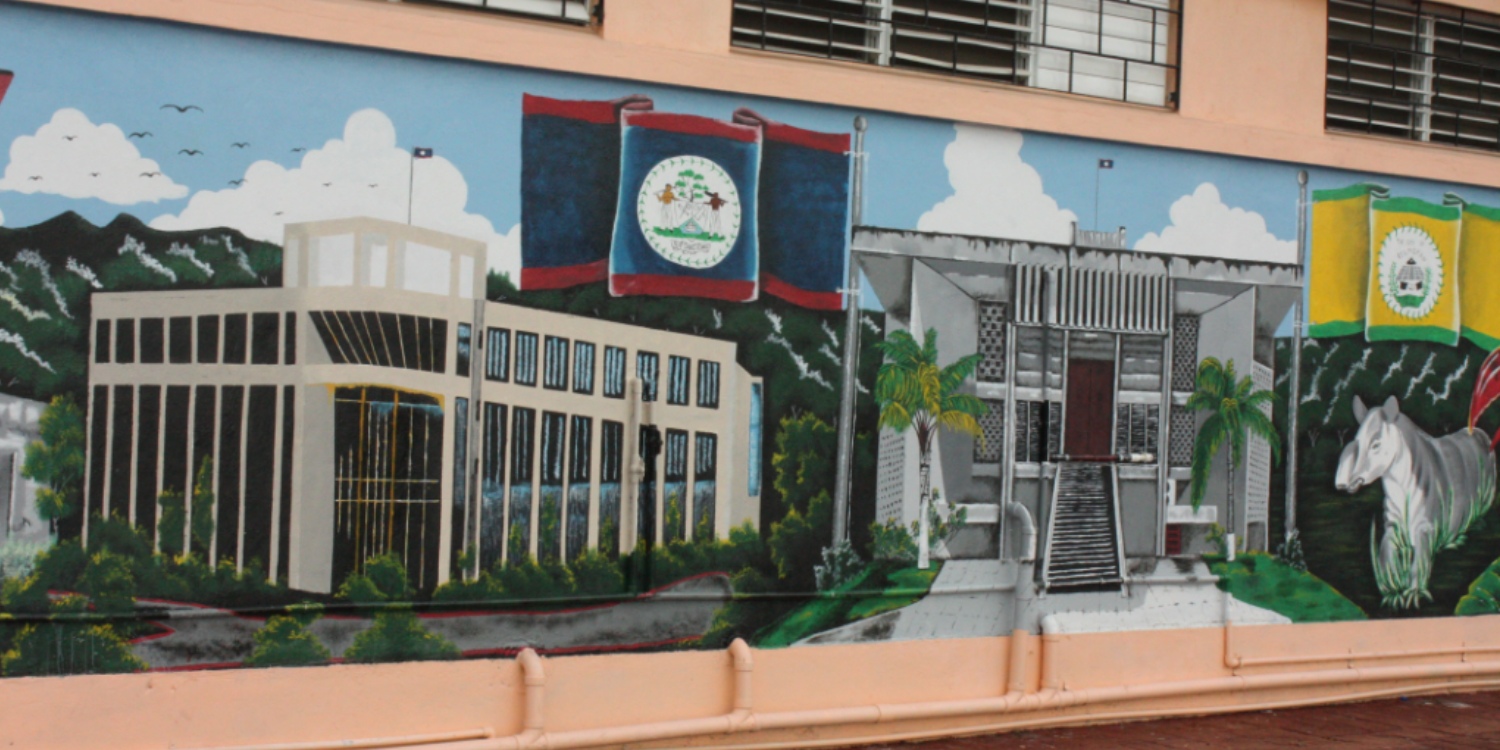
The DPSSC Ltd company created by Dos Pinos in 2014, in Belize, allowed the cooperative to pay part of the salary of its senior executives without tax reductions or social security. Photo: Andrés Bermúdez Liévano.
In 2017, the existence of the company in Belize and the salary scheme became public knowledge through the press. The Department of Taxation and the Costa Rican Social Security Fund carried out investigations and determined that Dos Pinos did incur omissions in the payment of income tax and social security contributions, respectively, for which they sanctioned the cooperative.
The Economic and Tax Crimes Prosecutor’s Office also opened a criminal investigation to see if those same events constituted a crime. However, when consulted by this journalistic alliance, the entity reported that it requested a dismissal due to the atypical nature, since it wasn’t possible to prove the crime of fraud against the public treasury based on the evidence collected.
The Prosecutor’s Office argued that during the investigation, they exhausted all possibilities to collect the necessary evidence in the process, since they intended to obtain evidence that couldn’t be incorporated into the file because it didn’t have a judge’s approval.
Asked about the investigation processes and sanctions against the cooperative, the Dos Pinos spokesman, Luis Mastroeni, preferred not to comment on the matter, arguing that there are still processes pending resolution.
He was also asked whether the cooperative collected the sums of the fines charged by the Department of Taxation from the Board of Directors and the manager, due to the fact that the law indicates that in cooperative associations, “the members of the board of directors and the manager, who execute or allow acts notoriously contrary to the interests of the cooperative to be executed, or who violate the law or the statutes, will be jointly and severally liable with their assets for the losses that such operations incur in the cooperative.”
Mastroeni indicated that due to being in the process of “administrative litigation, both in the Treasury and in Social Security, we can’t give any statement.”
__________________________________________________
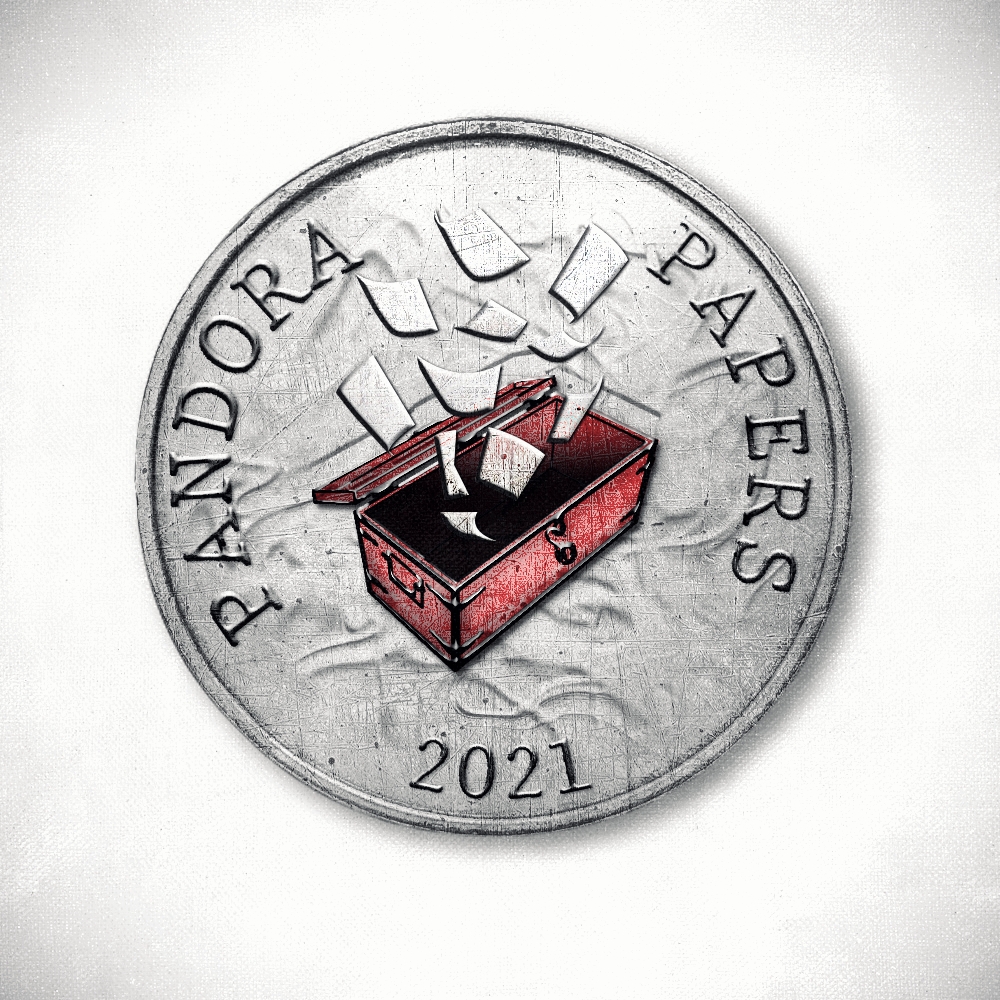
This investigation was carried out by Contracorriente and the Latin American Center for Journalistic Investigation (CLIP) within the Pandora Papers led by the International Consortium of Investigative Journalists (ICIJ).


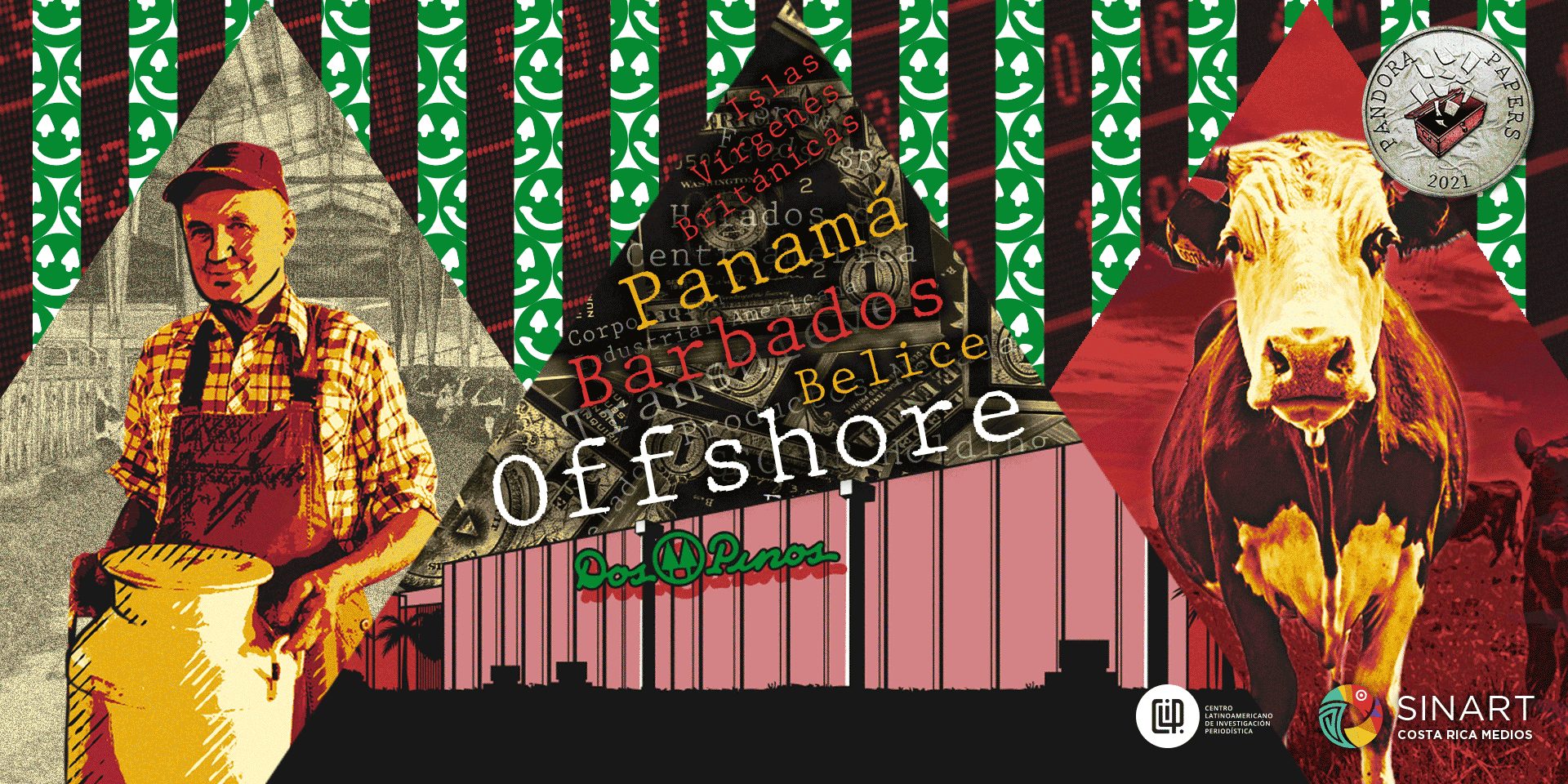




Comments